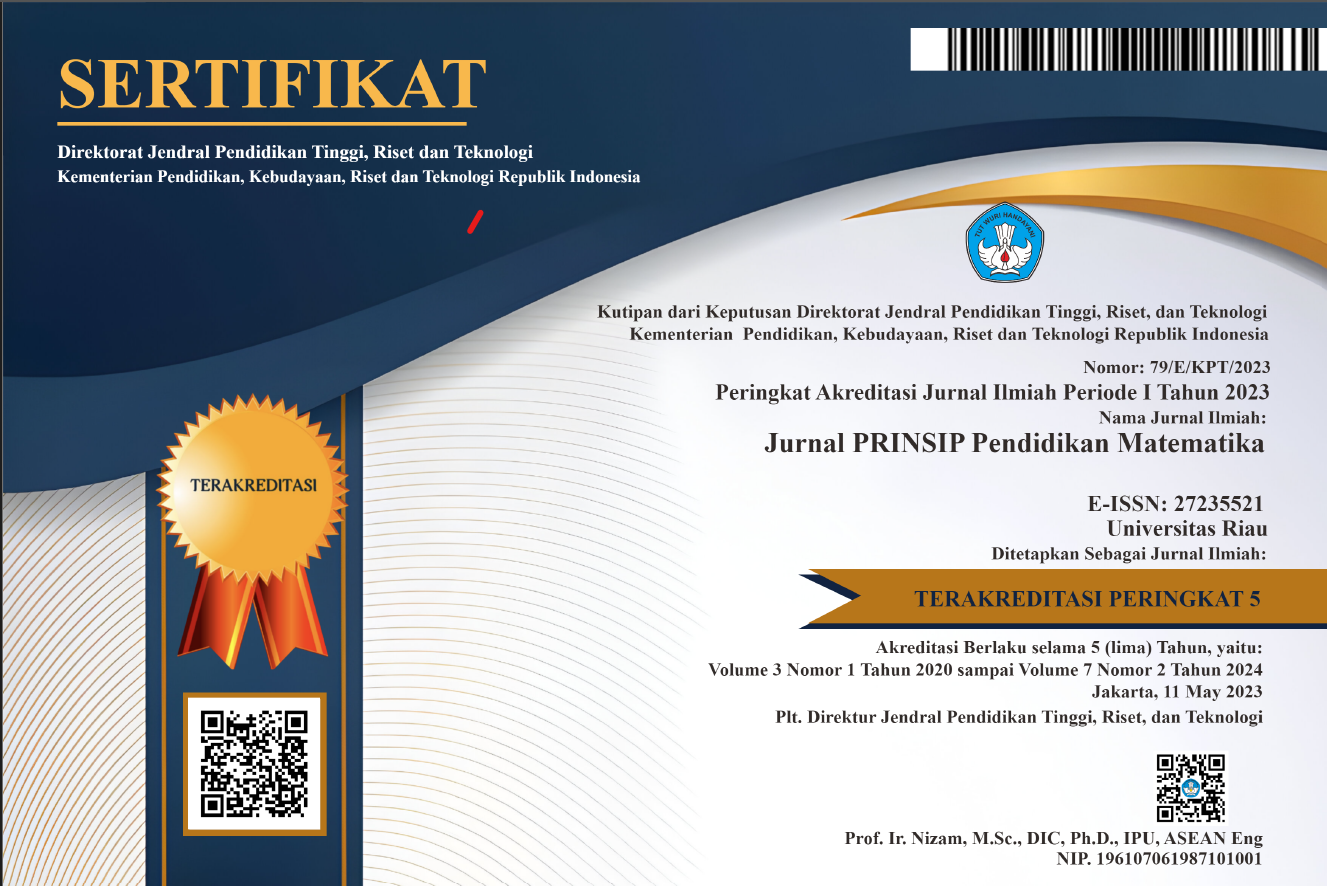DEVELOPMENT OF MATHEMATICS LEARNING MEDIA USING KAHOOT APPLICATION
Abstract
Learning in the Industrial Age 4.0 is currently expected to produce quality human resources to face these global developments and competition. The implication of this is that it is expected that teachers will be creative and active in designing and conducting creative and innovative learning. Based on this, the researcher aims to produce mathematics learning media using the Kahoot application, tested for validity. This research was conducted in the even semester of the 2020/2021 academic year. The type of research used in this research is research and development with ADDIE development design. The validation sheet is a data collection instrument used in this study. The non-test technique was used to obtain data from this study by asking for responses from 4 expert validators. The data obtained were analyzed using quantitative descriptive techniques. Based on the analysis of the data obtained information that the resulting mathematics learning media using the Kahoot application that has been tested for validity with very valid criteria or with a percentage of 82.78%.
Downloads
References
Akbar, S. (2013). Instrumen perangkat pembelajaran. Remaja Rosdakarya.
Akhlis, I., & Dewi, N. R. (2014). Pengembangan perangkat pembelajaran science berorientasi cultural deviance solution berbasis inkuiri menggunakan ICT untuk mengembangkan karakter peserta didik. Jurnal Pendidikan IPA Indonesia, 3(1).
Ardiansyah, M. (2020). Pemanfaatan aplikasi KAHOOT! sebagai media pembelajaran matematika kreatif. JUMLAHKU: Jurnal Matematika Ilmiah STKIP Muhammadiyah Kuningan, 6(2), 145–155.
Basuki, Y., & Hidayati, Y. (2019). Kahoot! or Quizizz: The students’ perspectives. Proceedings of the 3rd English Language and Literature International Conference (ELLiC), 202–211.
Bicen, H., & Kocakoyun, S. (2018). Perceptions of students for gamification approach: Kahoot as a case study. International Journal of Emerging Technologies in Learning, 13(2).
Dellos, R. (2015). Kahoot! A digital game resource for learning. International Journal of Instructional Technology and Distance Learning, 12(4), 53–56.
Undang-Undang Sistem Pendidikan Nasional, (2003). http://citeseerx.ist.psu.edu/viewdoc/download?doi=10.1.1.88.5042&rep=rep1&type=pdf%0Ahttps://www.ideals.illinois.edu/handle/2142/73673%0Ahttp://www.scopus.com/inward/record.url?eid=2-s2.0-33646678859&partnerID=40&md5=3ee39b50a5df02627b70c1bdac4a60ba%0Ahtt
Fitryanisa, S. M. A. (2019). Media pembelajaran Kahoot dalam pembelajaran Bahasa Arab di UIN Maulana Malik Ibrahim Malang. Seminar Nasional Bahasa Arab Mahasiswa III UNM, 3, 19–37.
Graham, K. (2015). TechMatters: Getting into Kahoot!(s): Exploring a Game-Based Learning System to enhance student learning. Loex Quarterly, 42(3), 6–7. http://commons.emich.edu/cgi/viewcontent.cgi?article=1272&context=loexquarterly
Hasmori, A. A., Sarju, H., Norihan, I. S., Hamzah, R., & Saud, M. S. (2011). Pendidikan, kurikulum dan masyarakat: Satu integrasi. Journal of Edupres, 1, 350–356.
Hsieh, Y. H., Lin, Y. C., & Hou, H. T. (2015). Exploring elementary-school students’ engagement patterns in a game-based learning environment. Educational Technology and Society, 18(2), 336–348.
Ikhsan, M. (2021). Peningkatan softskill ICT guru melalui pembuatan animasi bagi guru Sekolah Dasar. Jurnal Pengabdian Kreativitas Pendidikan Mahakam (JPKPM), 1(1), 26–30.
Irwan, I., Luthfi, Z. F., & Waldi, A. (2019). Efektifitas penggunaan Kahoot! untuk meningkatkan hasil belajar siswa [Effectiveness of using Kahoot! to improve student learning outcomes]. PEDAGOGIA: Jurnal Pendidikan, 8(1), 95–104.
Lai, C. H., Lin, Y. C., Jong, B. S., & Hsia, Y. T. (2014). Adding social elements to game-based learning. International Journal of Emerging Technologies in Learning, 9(3), 12–15. https://doi.org/10.3991/ijet.v9i3.3294
Marwah, S. S., Syafe’i, M., & Sumarna, E. (2018). Relevansi konsep pendidikan menurut Ki Hadjar Dewantara dengan pendidikan islam. TARBAWY: Indonesian Journal of Islamic Education, 5(1), 14–26.
Mohd Muhridza, N. H., Mohd Rosli, N. A., Sirri, A., & Abdul Samad, A. (2018). Using Game-based Technology, KAHOOT! for classroom engagement. LSP International Journal, 5(2), 37–48. https://doi.org/10.11113/lspi.v5n2.77
Mulyatiningsih, E. (2011). Riset terapan bidang pendidikan dan teknik. UNY Press.
Plump, C. M., & LaRosa, J. (2017). Using Kahoot! in the classroom to create engagement and active learning: A Game-Based Technology Solution for eLearning novices. Management Teaching Review, 2(2), 151–158. https://doi.org/10.1177/2379298116689783
Putri, A. R., & Muzakki, M. A. (2019). Implemetasi Kahoot sebagai media pembelajaran berbasis digital Game Based Learning dalam mengahadapi era Revolusi Industri 4.0. Prosiding Seminar Nasional Universitas Muria Kudus, 1–7.
Sugiyono. (2012). Metode penelitian pendidikan (Pendekatan Kuantitatif, Kualitatif, dan R&D). Alfabeta.
Sulistiyawati, W. S., Sholikhin, R. S., Afifah, D. S. N., & Listiawan, T. L. (2021). Peranan game edukasi kahoot! dalam menunjang pembelajaran matematika. Wahana Matematika Dan Sains: Jurnal Matematika, Sains, Dan Pembelajarannya, 15(1), 56–57.
Surjono, H. D., Muhtadi, A., & Wahyuningsih, D. (2017). The Implementation of Blended Learning in Multimedia Courses for Undergraduate Students in Indonesia. International Journal of Information and Education Technology, 7(10), 783–786. https://doi.org/10.18178/ijiet.2017.7.10.972
Syukur, I. A. (2014). Profesionalisme guru dalam mengimplementasikan teknologi informasi dan komunikasi di Kabupaten Nganjuk. Jurnal Pendidikan Dan Kebudayaan, 20(2), 200–210.
Turel, O., & Osatuyi, B. (2017). A peer-influence perspective on compulsive social networking site use: Trait mindfulness as a double-edged sword. Computers in Human Behavior, 77, 47–53. https://doi.org/10.1016/j.chb.2017.08.022
Copyright (c) 2021 Jurnal Prinsip Pendidikan Matematika

This work is licensed under a Creative Commons Attribution-NonCommercial-ShareAlike 4.0 International License.





